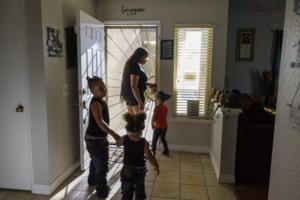Parents
/Home & Leisure

How to help kids with back-to-school anxiety
SEATTLE -- The first few days of school can spark excitement and anticipation for kids: they look forward to seeing friends, learning something new or getting back to sports and clubs.
But for many students, this time of year can also be one of significant stress.
As children go back to school, they may be worried about fitting in socially, ...Read more

Family guide to new movie releases
'HIM'
Rated R for strong bloody violence, language throughout, sexual material, nudity and some drug use.
What it’s about: An up-and-coming star quarterback enters into a secretive football training camp with his idol.
The kid attractor factor: This is a brutal horror movie, not for kids, but teens might be intrigued.
Good lessons/bad ...Read more

Family guide to new movie releases
'THE LONG WALK'
Rated R for strong bloody violence, grisly images, suicide, pervasive language, and sexual references.
What it’s about: In a dystopian America, a group of boys enter a walking contest for a cash prize. The lone survivor wins.
The kid attractor factor: While this features teenage boys as the main characters, it's a tough ...Read more

'Generations' of vulnerable kids lured to join violent ranks of Minneapolis gangs, feds say
MINNEAPOLIS -- Scott Redd watched as five young men juked the basketball around defenders, putting up jump shots as music boomed and people trickled in and out. On a typical night, open gym at Sabathani Community Center draws 40-50 people from around the neighborhood.
To Redd, Sabathani’s chief executive, the scene in front of him is part of ...Read more

Transgender kids' lives are on the line as Children's Hospital of Philadelphia fights Trump over patient medical records, parents say
The 5-year-old child sat sullen before the birthday cake, refusing to blow out the candles. “Wishes don’t come true,” the child said. “I wish to be a boy and it’s not coming true.”
The child cried at the hairdresser’s because the cut wasn’t short enough and vomited at a kindergarten classmate’s girls-only party, pleading to go...Read more

Family guide to new movie releases
'THE CONJURING: LAST RITES'
Rated R for bloody/violent content and terror.
What it’s about: Paranormal investigators Ed and Lorraine Warren take on one of their last cases with their daughter Judy leading the way.
The kid attractor factor: This haunting horror movie is not for kids, but maybe some appeal for teens.
Good lessons/bad lessons...Read more

Man steals car with three children inside, crashes in Malibu after pursuit, authorities say
LOS ANGELES — A man was arrested after stealing a car in East Los Angeles with three children inside, then crashing it in Malibu during a police pursuit Friday evening, officials confirmed.
The car, a light-colored sedan, was left running with three children inside at a 7-Eleven on East Olympic Boulevard, according to the Los Angeles County ...Read more

Family guide to new movie releases
'CAUGHT STEALING'
Rated R for strong violent content, pervasive language, some sexuality/nudity and brief drug use.
What it’s about: A Manhattan bartender gets caught up in a drug deal/money grab and suffers the consequences.
The kid attractor factor: This is an adult crime caper, not much appeal for kids.
Good lessons/bad lessons: If you ...Read more

Column: You should ask your teens for shopping and investing tips
Next time your teenagers have a craving for the ultra-spicy Buldak ramen or the fierce-looking Labubu toy, don’t scratch your head and question their taste. Rather, consider yourself lucky, because they are helping you spot the next billion-dollar brand before it gets on global investors’ radar.
With birth rates falling around the world, ...Read more

Family guide to new movie releases
'HONEY DON'T!'
Rated R for strong sexual content, graphic nudity, some strong violence, and language.
What it’s about: A Bakersfield, California, private investigator looking into the suspicious death of a potential client turns up church corruption and police malfeasance during her investigation.
The kid attractor factor: Not much — this...Read more

Family guide to new movie releases
Family guide to new movie releases — "Highest 2 Lowest" and "Nobody 2."
'HIGHEST 2 LOWEST'
Rated R for language throughout and brief drug use.
What it’s about: A wealthy music mogul is faced with a dilemma when his son's best friend is kidnapped and he has to pay the ransom or save his own company with the money instead.
The kid ...Read more

A coach detained. A friend gone. As kids confront immigration realities, they're learning to stand up
LOS ANGELES — The scene at the dais in Riverside's City Council chambers looked a bit different on a recent Monday morning: Instead of men and women in business attire, children wearing navy blue T-shirts emblazoned with vibrant orange and yellow butterfly wings occupied the swivel chairs.
The children were participating in a mock council ...Read more

Family guide to new movie releases
'FREAKIER FRIDAY'
Rated PG for thematic elements, rude humor, language and some suggestive references.
What it’s about: This sequel to the 2003 body swap comedy sees Anna (Lindsay Lohan) all grown up and contending with a teenager of her own while she gets ready to marry the handsome Eric (Manny Jacinto), while managing his daughter, and her...Read more

2 years after cannabis legalization in Maryland, teachers see impact on kids
BALTIMORE — It’s been two years since recreational cannabis became legal in Maryland. While revenue has increased and arrests for cannabis possession have decreased, health experts and school officials say there’s an often-overlooked impact — many kids don’t see the drug as risky.
Marijuana legalization has normalized adult use and ...Read more

You're more likely to win Powerball 100 times than do what this California mom did
LOS ANGELES — An Apple Valley, California, mother just went 4 for 4 on her kids all being born on the date 7/7.
Just before Nauzhae Drake, now 26, delivered her firstborn, she called her mother while driving to school. She told her that she saw a license plate that ended in four sevens — her lucky number. Drake's mom took it as a sign.
"...Read more

Family guide to new movie releases
'THE NAKED GUN'
Rated PG-13 for crude/sexual material, violence/bloody images and brief partial nudity.
What it’s about: A reboot of the 1980s "Police Squad!" comedies about a hapless detective who stumbles into solving crimes.
The kid attractor factor: Teens might be drawn to the broad humor.
Good lessons/bad lessons: Billionaires are ...Read more

Family guide to new movie releases
'THE FANTASTIC FOUR: FIRST STEPS'
Rated PG-13 for action/violence and some language.
What it’s about: A quartet of superpowered scientists try to save the world on the retro 1960s Earth-828 planet.
The kid attractor factor: The comic book origins, superheroes and spectacle.
Good lessons/bad lessons: We can only save the world — and each...Read more

'I already want to cry': Undocumented parents prepare for the unthinkable: Giving up their kids
LOS ANGELES — Sonia's son has been anxious lately, crying and asking why their neighbor had been picking him up from preschool instead of his mom. She doesn't know what to tell him. At just 4 years old, he's too young to understand the truth.
Sonia has lived in the U.S. without legal status for 25 years, harvesting squash, cilantro and ...Read more

Family guide to new movie releases
'I KNOW WHAT YOU DID LAST SUMMER'
Rated R for bloody horror violence, language throughout, some sexual content and brief drug use.
What it’s about: A group of friends are wracked by guilt after a terrible accident and start receiving ominous anonymous notes.
The kid attractor factor: Teens will be drawn to the slasher about young friends. ...Read more

Family guide to new movie releases
'SUPERMAN'
Rated PG-13 for violence, action and language.
What it’s about: The iconic superhero is reborn in James Gunn's vision, but with all the familiar elements in place — enemy Lex Luthor, lover Lois Lane — as he fights for truth, justice, and a better tomorrow.
The kid attractor factor: Older kids will be drawn to the superhero ...Read more
Popular Stories
- How to help kids with back-to-school anxiety
- 2 years after cannabis legalization in Maryland, teachers see impact on kids
- Family guide to new movie releases
- 'Generations' of vulnerable kids lured to join violent ranks of Minneapolis gangs, feds say
- Transgender kids' lives are on the line as Children's Hospital of Philadelphia fights Trump over patient medical records, parents say








